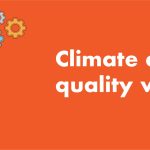Two WEMC team members share their climate service motivations and inspirations
After hearing from our data analyst: Beatriz Contreras about her motivations and inspirations for working in climate services, we reached out to other members of the WEMC technical team. Today we hear from Nathalia Correa Sánchez, one of our data engineers and Sittukala Saravanan, our web application developer. We also asked them about their opinions on climate services.
Nathalia has experience in working with on-site hydrometeorological network data and a MEng in Water Resources from the Universidad Nacional de Colombia. Nathalia’s interest in climate data and services sparked during her undergraduate degree where she dealt with the analysis of environmental data and participated in related research. During her master’s degree, Nathalia used atmospheric data analysis for energy characterisation. It was from these degree-level experiences, focused on South America and her hometown, where Nathalia began to question climatic effects on societal development. Today, she is motivated to contribute towards the development of tools to assist climate change adaptation.
Sittukala is an advanced computer science MSc graduate from the University of Leicester with over four years professional software engineering experience in front-end technologies. Sittukala demonstrated her interest in climate change and energy matters whilst working as a product developer intern with a company in association with the Sustainable Development Goals of UN Global. During her time at WEMC, Sittukala has been at the forefront of the Teal tool development. She noted that this experience has boosted her motivation to development dynamic climate services.
What elements of climate services do you think are the most important?
Nathalia highlighted the dissemination element of climate services:
“Since climate services create knowledge, I believe that one of the essential aspects of climate services is their dissemination and exceeding the reach of people who can access climate information. These climate services will allow better decisions and adaptation polices to be made to improve societal development, and therefore the information must be understandable and high quality”.
Sittukala placed emphasis on how climate services bring climate data into the forefront of mitigation and adaptation measures:
“The most beneficial aspect of climate services I feel is the acknowledgement of climatic historical evidence. This is key to consider in order to avoid any similar issues from the past and to work towards betterment in the future, especially now prediction and forecast data are so advanced”.
Please subscribe to the WEMC newsletter and follow us on Twitter, LinkedIn, Instagram and YouTube to stay up to date with our events and news.




